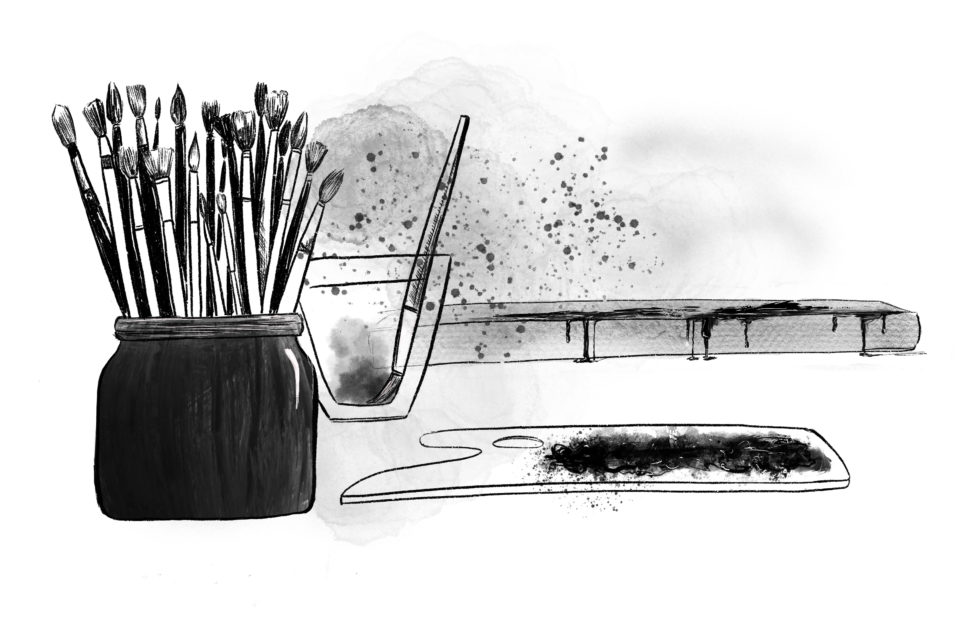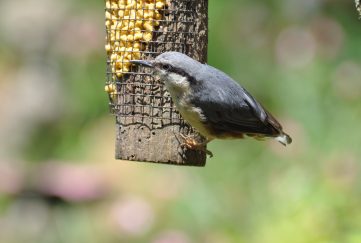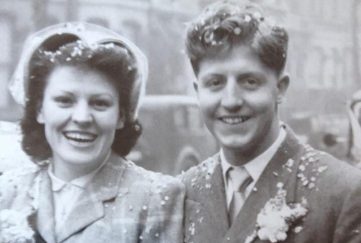The Story Of A Masterpiece: An Artist’s Romance

This story, by Agnes Grozier Herbertson, first appeared in the pages of “The People’s Friend” in April 1905.
“The night was dark,” the poet had written, “and the clouds were purple. Then my beloved let fall her hair, and, lo! The Dawn.”
The artist read the words, then he closed the book and pushed it back from him. He brushed his hair back from his brows with an absent gesture, then he rose, and began to pace up and down the room.
The sunlight fell upon his face: it was rapt, with the rapture of a new inspiration, but about the fine brow and the weary eyes were lines of care.
The floor gave back the sound of his light steps: they were eager and fitful, but the fitfulness and the eagerness were not those of youth.
The artist’s form was slight and sensitive, but the shoulders were bowed a little, and the slightness of the form was worn to emaciation.
When he smiled pain lurked about his eyes; and the glance of the eyes was always absent. It was the glance of one who lived in a world of dreams, of one who had crept into it shuddering, and who still feared contact with aught in the world without.
Their expression was gentle, but strangely un-tender. All in all, the eyes were those of the artist who has no thought of aught but his work.
The room in which the man paced was a bare and poverty-stricken one. Pictures, pictures stood everywhere, but these formed the bulk of its furniture. No carpet was upon the floor, and in one corner of the room stood a shabby couch, which also served, obviously, for a bed.
The few chairs in the room were of plain wood, and they were laden with untidy heaps of draperies.
The fire was out: the sunlight struck upon the dead ashes of it. The windows of the room were smeared and dirty. In one corner lay a heap of half-worn shoes.
Of all this the artist saw nothing. He paused suddenly before the empty grate, and held out two thin hands and shivered. Then he turned suddenly away.
“It should work out,” he muttered in his beard, “but only the hair must be seen. Only the hair.”
He went out into the street.
The idea with which the poet had inspired him grew upon him: the idea of a picture, of the hidden face of a girl and a mass of hair, of beautiful hair.
His pace unconsciously quickened, and into his thin cheeks crept a vivid crimson stain. When the end of the street was reached, he found it impossible to take the turning which was a part of his daily walk, and to proceed.
He turned sharply about and went home.
The servant girl was scrubbing the studio floor, and turned to stare, open-mouthed, when he entered.
He crossed to his easel and stood there, his nervous hand twitching, meditating. His peaked chin, with its pointed beard, seemed cruelly sharp and thin where the sunlight touched it.
Mary Ann noticed that one of his boots was burst on one side. She dropped her scrubbing brush with a clatter, and the artist startled.
“Please be careful,” he said irritably, and without turning round. He shifted his position a little and went on with his thoughts.
The girl pursued her task, and finished it. The artist-lodger was her idol. She shook at the sound of his quick footfall, and trembled when he was in the room. He did not know how much more squalid the room would have been but for surreptitious ministrations of hers which were not among the tasks set her by her mistress, and which would have brought a scolding in their wake had they been discovered.
She shook now, but she finished her task. Then she moved toward the door, with her pail in one hand; but her eyes were fixed on the artist’s face, and not on the way before her.
The corner of a chair jutted out at her side. It caught her sharply, she staggered, then fell.
Crash! Over went the bucket. The dirty water swirled over the clean boards.
Mary Ann raised herself. She looked, then she burst into tears.
Philip Wain had turned with a sharp exclamation at the first clatter of her fall. He stood now suddenly silent, transfixed. Into his eyes pierced a sudden light.
He was regardless of the disaster; of the flood at his feet; of the girl’s tears. His gaze was fixed upon her hair.
It had fallen as she fell and lay, a rolling mass of gold upon her shoulders.
As she stooped now in a wild attempt to stem the flood which ran over the floor it loosened itself further, and fell in great shining clusters about her face. In an instant it would touch the floor. The artist caught the girl’s shoulder involuntarily, and pulled her upright.
The he looked away, his hand still upon her shoulder, and his mind quite unconscious of her wondering stare. His one thought was — he had found what he wanted. He thought of nothing else.
The girl’s half-bending attitude, the shimmering flood of hair: these flashed again before his rapt eyes. His fingers twitched, aching to begin; and his soul yearned after the expression of the dream that shook him.
He roused himself impatiently, and brought his wandering gaze to Mary Ann’s face. He knew very well the type of features he might expect to find there, and he found it.
Her nose might have been worse, perhaps, but it was very bad; her mouth was plebeian, if kindly; and her eyes were the eyes of any London serving-maid of her class.
Her brow was narrow, and overhung her eyes; and her chin was nondescript, although a touch of wistfulness lay in the turn of it. And round and about this face hung that halo of hair!
“Girl, you have beautiful hair,” he said to her abruptly. “You must let me paint it.”
“Yes, sir,” said Mary Ann, trembling.
*
He began to arrange ways and means, and Mary Ann fastened up what she now felt to be her one glory and pride — since he thought it beautiful — and dried the floor with a dirty cloth while he talked. She stipulated only that he should arrange with the “missis”. Then she went trembling away.
The artist interviewed the “missis” with a shudder, and feeling himself to be undergoing much for art’s sake. Then the work began.
Philp Wain was agreeably disappointed in Mary Ann as a model. He had expected — and dreaded — a host of ignorant questions, a pert interest in the progress of the picture, and a vulgar inability to keep still.
He found none of these things.
Mary Ann could sit still, and would have sat on until she dropped at his feet, had she been called upon to do so. Her interest in the picture was great, but her awe of the artist was greater. It never occurred to her to question him. To have stood up in church and questioned the preacher would have appeared to her as likely a proceeding. Moreover, she was too happy for speech. To sit there with his eyes upon her was enough. Life, she felt, could offer her no greater bliss.
The days passed on, and the picture grew. The artist became more wrapt up in it day by day, and day by day became less conscious of the existence of the world, and of outer things.
This was not the first creation in which he had become absorbed; but his absorption had never been as deep as now. The bare studio was his world, and the completion of the painting the one aim of his existence.
He never thought of Mary Ann, and he never forgot her beautiful hair. The days passed.
Once came an interruption: it was only that. Mary Ann broke her long silence. Her eyes were red with weeping.
“The gent downstairs, he has asked me to sit for ‘im,” she said, “and the missis says I must.”
She hung her head. Intuitively she knew he would be angry; but she had not dreamt of such a pallor such a passion of anger as passed over his face at her words.
He pushed aside his brushes.
“You shall not sit for him,” he said coldly. “I found you; you are mine. You shall not sit for him.”
Her heart throbbed until she could hear naught else in the world.
“The missis says,” she faltered after a while.
But the artist was not listening. He left the room in search of the landlady.
“She shall not sit for him. My picture! My picture!” He could say naught else. The words whistled between his shut teeth.
But when the matter was settled he was not at his ease. Work did not go well with him that morning. His mind strayed, and his hand seemed to have lost its cunning. He looked at the beautiful hair with unseeing eyes. His fingers played absently upon the handle of his brush, beating out the refrain which ran in his mind.
“What one has wanted, another will want; what one has lost another will gain.”
The words beat through and through his brain. When he dismissed Mary Ann it was with a curt nod; which sent her away with tears in her eyes.
Philip Wain slept ill that night, but with dawn came an answer to the problem. When Mary Ann appeared later with his breakfast, he greeted her strangely.
Mary Ann’s heart told her the eagerness was not for her; but she blushed, and her “Yes, sir,” was distinct if it faltered with the violence of the thrill that shook her. She could think of no greater happiness, no greater glory, no fairer heaven than to be his wife.
That he might love her one day was an expectations which never entered into her head. She did not think of love — from him to her. He would make her the most blessed woman on earth: his wife. That was enough.
The painting of the picture went on. Artist and model were married, and it went on still. There was no change in attitude of model or artist. Neither of them had thought of any change.
When the landlady gave the girl notice, Mary Ann was surprised. She had expected to go on as usual with her duties; but she could sit the longer, she decided, as things were.
The picture, the artist declared, would make him famous. True, he had said this before, and of other pictures; but of that Mary Ann neither knew nor cared anything, and he had not before made the assertion with such fervour as that with which he made it now.
He felt himself to be nearing the completion of the work, the work of his lifetime, the work by which he was to rise or fall. A fever seized him, a strange glamour caught him in its clutches. He worked on as one possessed. The picture was a striking one, but its most striking feature was a flood — a glory — of hair of pure gold.
Upon this the artist laboured. It was always before his eyes, day and night. All the world was lost in the blaze of yellow light.
Mary Ann watched, and wondered, and waited, until her wondering and waiting were put to flight by the appearance of an old problem: the weary problem of how to make two wide-open ends meet.
“I must turn my hand to something,” thought she cheerfully, and with the philosophy of the class in which most women, after marriage, have to remain breadwinners.
She found work, and wrought hard at it, and her only fear was that he should discover what she had done and be displeased.
But he did not notice her absences, for she was always there when he wanted her, and he was deep in his work.
When Mary Ann made the dreary discovery that what had kept one would not keep two, he knew nothing of it. Bread was put before him, and he ate. It did not occur to him to ask from whence it had come.
His thoughts were of Fame and of the glory of golden hair. Had he been left to feel the pangs of hunger he would have taken his brush and have painted one of the detested pot-boilers which would have kept him alive. Perhaps the great work would have suffered, perhaps not.
He was not allowed to feel the pangs of hunger, and Mary Ann’s cheek grew wan and white while she did the work of two.
Take a look at this video of Illustrations Editor Manon creating the fantastic design for this story!
One day she was detained at her work, and kept him waiting a moment or two. The delay fretted him, and she found him in a fever of impatience, yearning to be at work.
“Where have you been? I have been wanting you. This is your time to sit to me,” he cried.
She made an evasive reply, and he was pacified, becoming lost in the glamour of his inspiration.
After that morning she was fearful of discovery. She worked less, and starved herself; but she said nothing. His plate was always full, and her tongue was eager only to remind him to empty it.
She was quiet, still, and shy, and happy — oh, wonderfully happy. She was crowning her life with its highest bliss, for she was laying it down for him. Was not she his wife?
Then came a day when the great world bowed down to her idol, even as she bowed; and her heart almost broke under its weight of joy. The picture was finished; it was approved, it was applauded. The country discovered a genius in its midst.
It fetched the genius from his garret, and put him in a palace and with him it fetched his wife. Success had come to him in the mid-day of his life. It comes so but seldom. The young it is who win success. It is so easy to grow too old to succeed.
The old days in the garret were over. Mary Ann found herself a very princess; but she was quiet, and shy, and wonderfully happy still. Perhaps that was why she was not quite a failure as the great artist’s wife in the eyes of the world.
The artist was not changed, for he was, above all things, an artist. He worked on, and in his new work appeared again the glory which had made him famous, the glory of a woman’s hair. How thin and wan the face was which it hid, he did not notice. He was buried in his work.
Then came a day when she was ill, and could not sit for him, and his world seemed to fall about his ears. Another day followed, and speedily, and the great physician told him his wife was dead.
The great physician was touched by the anguish on his face.
“Yes, it seems hard,” he said gently, “to come in the first hour of success, very hard. She must have suffered much, very much. You were poor once, I think? It has told on her.”
The artist hardly seemed to be listening.
“Yes, she was poor when I married her,” he said, “very poor.”
Then he became silent.
When the doctor was gone, he went up to his wife’s bedroom and stood there, like a statue, beside the bed. His face was hardly less white than the face which lay there; but he was not looking at the face.
He stood there for many moments. Then he went forward, and pulled up the blind, which had been drawn down. The glory of the summer sun struck across the room, and fell in a wide flash upon the bed. It fell upon the golden glory which lay there enshrouding the pale dead face.
The artist went quietly away. He brought to the room an easel, brushes, an armful of the contents of the studio. Then he went away and returned with a picture which was lacking only the last few master touches, and set it in the right light.
Then he propped up the slender form upon the bed. He tossed the golden hair into a dazzling, bewildering brilliance, and tangled it about the half-hidden face. He made shadows about it.
This was not “Dawn”, but “Sunset”.
He lifted his brushes and began to paint.
Click here to read more of our fantastic Fiction content.
Click here to delve into our dramatic Daily Serial.





